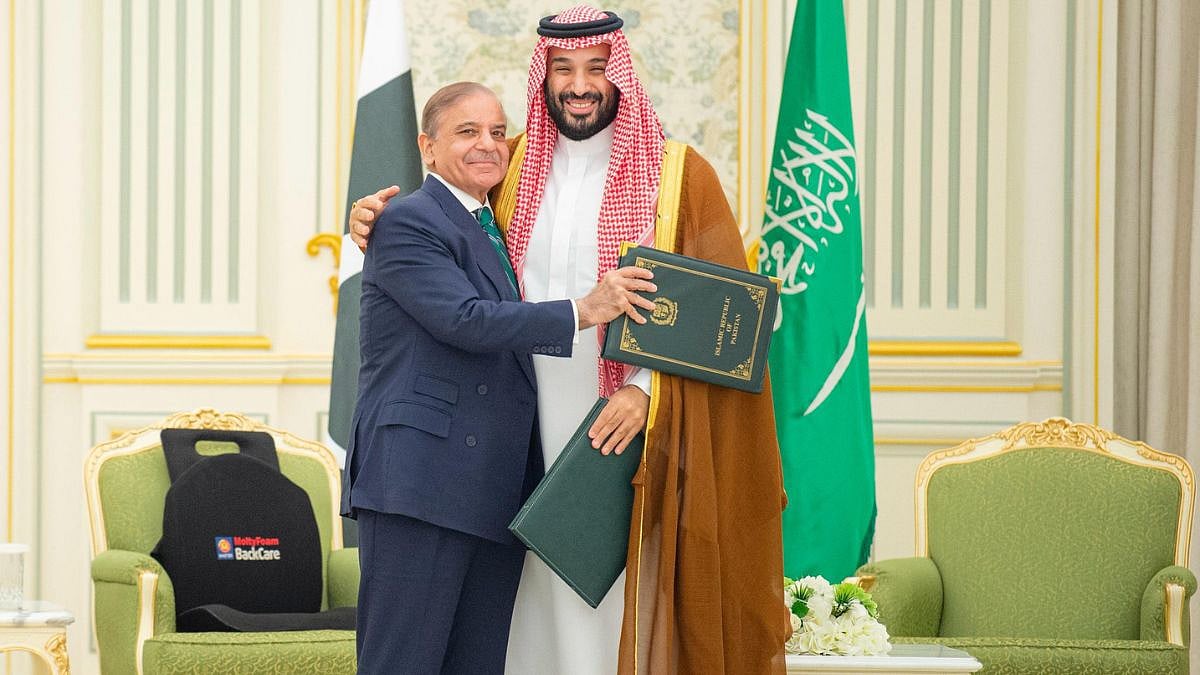Saudi-Pakistan Defence Pact Shifts Middle East Security, Ties Riyadh To Beijing
The announcement of a mutual defence pact between Saudi Arabia and Pakistan could have consequences that will go far beyond what is being seen as the House of Saud buying an extra insurance cover against a possible Israeli attack.

Saudi and Pakistani officials shake hands after signing a comprehensive defence agreement | X @999saudsalman
The announcement of a mutual defence pact between Saudi Arabia and Pakistan could have consequences that will go far beyond what is being seen as the House of Saud buying an extra insurance cover against a possible Israeli attack.
The pact was revealed just days after Israel’s strike on Qatar, an event that underscored the frailty of American guarantees to its allies and forced Riyadh to expand on an earlier pact with Islamabad, which allowed for use of Pakistani forces on Saudi soil.
That the Saudis have now turned to Islamabad, and by extension Beijing, to underwrite their defence raises the most uncomfortable of questions: If even Riyadh no longer trusts American protection, would anyone else?
Saudi Arabia has long been held as the quintessential American client state—the kingdom where oil flowed in dollars, American arms guaranteed security, and Washington’s word carried the force of strategic reassurance. The new pact is sweeping.
A senior Saudi official told Al Jazeera that it is a “comprehensive defensive agreement that encompasses all military means.” This seems to imply that it grants Saudi Arabia the cover of Pakistan’s nuclear arsenal, one that claims not to adhere to a “no first use” doctrine.
By extension, it also means West Asia now has two opposing nuclear-backed blocs—Israel and the United States on one side, and Pakistan and Saudi Arabia on the other.
The ripple effects extend far beyond the region. Pakistan sources the overwhelming majority of its weaponry from China. Saudi Arabia, by binding itself to Pakistan’s defence umbrella, is tethering its security to the Chinese military-industrial complex. This has an even greater potential ramification.
The China-Pakistan Economic Corridor, Beijing’s flagship Belt and Road project, may now gain a de facto extension to the Persian Gulf, providing China with an energy lifeline that bypasses the Strait of Malacca, long considered its most vulnerable chokepoint.
India, meanwhile, finds itself in a strategic bind—its most vital energy supplier has placed its security in the hands of India’s arch-enemy. It has to be seen how New Delhi will reconcile the planned India-Middle East-Europe Economic Corridor, a signature initiative intended to counter China’s Belt and Road, with the latest developments.
Finally, there is the matter of money. The Saudi-American bargain of the past half-century was built on oil priced in dollars, underwritten by US military protection. With protection outsourced to Islamabad and, indirectly, to Beijing, the dollar’s privileged role in global energy markets looks increasingly precarious. If the Suez crisis of 1956 symbolised the eclipse of European empires, the Saudi-Pakistan pact may come to be remembered as the moment when America’s unipolar dominance of the world started fraying.
Published on: Saturday, September 20, 2025, 07:06 AM ISTRECENT STORIES
-
-
-
-
-